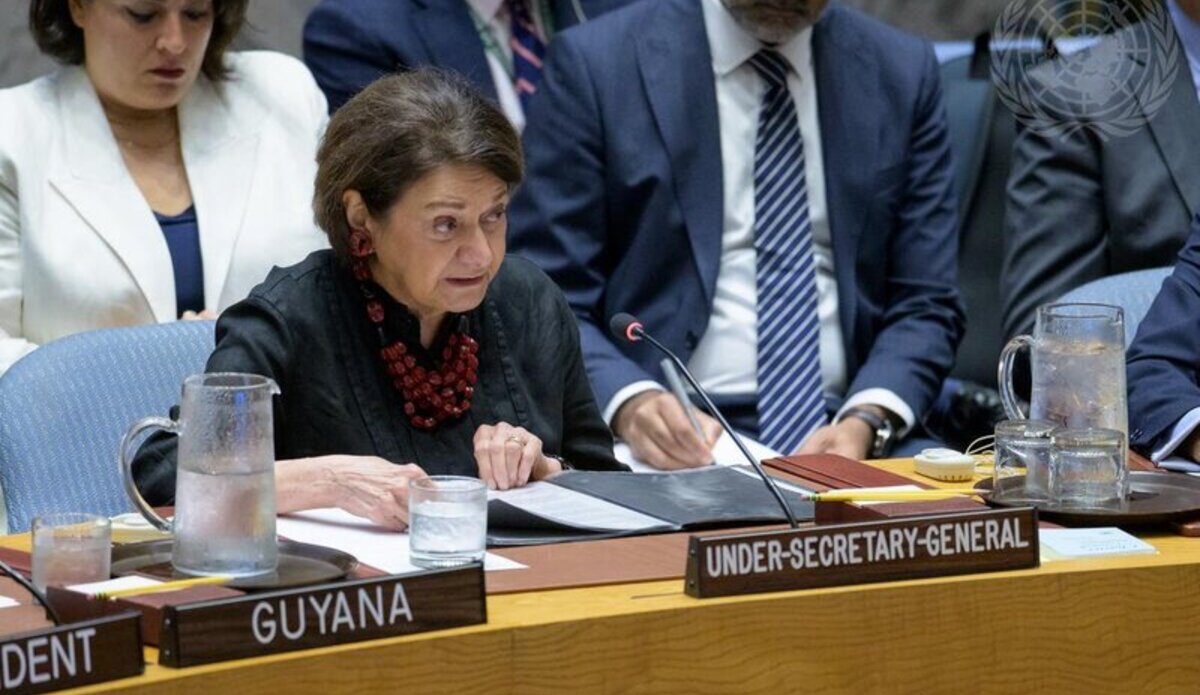Remarks by Rosemary DiCarlo,
Under-Secretary-General for Political and Peacebuilding Affairs
Security Council on "Threats to International Peace and Security"
New York, 20 June 2025
Madame President,
We meet as the scope and scale of attacks in Iran and Israel continue to widen, with grave consequences for civilians in both countries.
In Iran, Israel claims to have targeted over 100 military sites and nuclear facilities, including the Kermanshah missile base, the Natanz and Isfahan nuclear facilities, and the Khondab (former Araak) heavy water reactor.
At the same time, government buildings, homes and residential neighborhoods, factories, hospitals, airports, and refineries have been struck in and around Tehran, Isfahan, Tabriz, Ahvaz, among other cities.
The bombing on 17 June of Iran’s state-run television channel during a live broadcast marked a chilling moment.
Residents of Tehran and other cities have received warnings to evacuate on more than one occasion. Iran has closed its airspace until further notice and has shut some border crossings.
In Israel, residential neighborhoods and essential infrastructure have been hit throughout the country, notably in Tel Aviv, Haifa, Bat Yam, Dimona, Petah Tikva, and Eilat.
Several civilian sites have been directly impacted by Iran’s airstrikes, including the Weizmann research institute in Rehovot, the Bazan petrochemical complex in Haifa, and yesterday, the Soroka Medical center in Beersheba.
A state of national emergency remains in place, with severe restrictions on air travel. Several areas in the occupied West Bank have also been impacted, and checkpoints and road closures are impacting movement, particularly for Palestinians.
Throughout the region, airspace remains severely constrained by these exchanges, not only within Iran and Israel, but also throughout Syria, Jordan, Lebanon, Iraq, and beyond.
The intensifying cycle of attacks and counterattacks has resulted in hundreds of civilian casualties, including fatalities, in both Iran and Israel.
According to Iran’s Ministry of Health, as of 19 June, 224 people had been killed and more than 2,500 others injured in Israeli strikes across Iran. The Health Ministry added that 90 per cent of the victims were civilians.
Other estimates, based on local non-governmental organizations and human rights groups, suggest the death toll is at least double the official figure.
In addition, there have been over 20 high-ranking Iranian military leaders killed, notably the Commander and Chief of Staff of the Iranian Armed Forces, the IRGC Commander-in-Chief and IRGC Intelligence Chief, as well as several nuclear scientists.
We have also received reports of significant displacement out of Tehran – a city of over 12 million residents – resulting in massive traffic jams. Fuel shortages are leading to long queues at petrol stations, sometimes for over five hours, further hampering movement.
And still, many remain trapped in their homes in Tehran with nowhere to flee. In the absence of bomb shelters or air raid sirens in the city and widespread internet blackouts, further strikes are bound to harm more civilians.
In Israel, the Office of the Prime Minister stated that, as of 19 June, Iran’s strikes have killed 24 people and injured 915 others, the vast majority civilians. The strikes have also damaged homes, leading to the displacement of Israelis.
Madame President,
We are teetering on the edge of a full-blown conflict and a humanitarian crisis.
International humanitarian law must be respected, including the principles of distinction, proportionality, and precaution in attack.
Attacks directed against civilians and civilian objects, and indiscriminate attacks, are strictly prohibited. Medical personnel and medical facilities, including hospitals, must be respected and protected.
We are witnessing in real time the impact of the conflict regionally, with missile launches by the Houthis in Yemen towards Israel, and heightened tensions involving armed groups in Iraq.
With each passing day of fighting, the danger, particularly for civilians, grows. Interceptions and explosives falling short have been reported over Lebanon, Jordan, Iraq, and Syria, sending debris into populated areas, sowing fear, and uncertainty.
Any further expansion of the conflict could have enormous consequences for the region and for international peace and security at large.
The fallout of the conflict is also economic. We cannot discount the global impact of a potential disruption of trade through the Strait of Hormuz – described by the World Bank as the “world’s most critical oil passageway.”
Trade through this vital route has already fallen by 15 per cent amid heightened regional tensions starting in late 2023.
Madame President,
International Atomic Energy Agency (IAEA) Director-General Grossi will address this Council shortly. Allow me at this juncture to express our appreciation to the IAEA and its staff still on the ground in Iran. We also convey our deepest gratitude to our UN colleagues who have continued to stay and deliver.
At the center of the ongoing conflict are concerns about Iran’s nuclear program. As the Secretary-General has consistently stated, the best way to address these concerns is through dialogue leading to a negotiated solution.
But the window to prevent a catastrophic escalation and achieve a peaceful resolution has not yet closed, as demonstrated by positive recent openings for diplomacy.
We welcome in this regard the talks between the Foreign Ministers of France, Germany, the UK, and Iran, [and the EU High Representative for Foreign Affairs and Security Policy and Vice-President of the European Commission] in Geneva today.
We strongly encourage such efforts. We must pursue every possible opportunity to de-escalate, to cease the hostilities, to settle disputes by peaceful means. The Charter that binds all of us mandates it.
The imperative for diplomacy has seldom been greater.
Thank you, Madame President.

